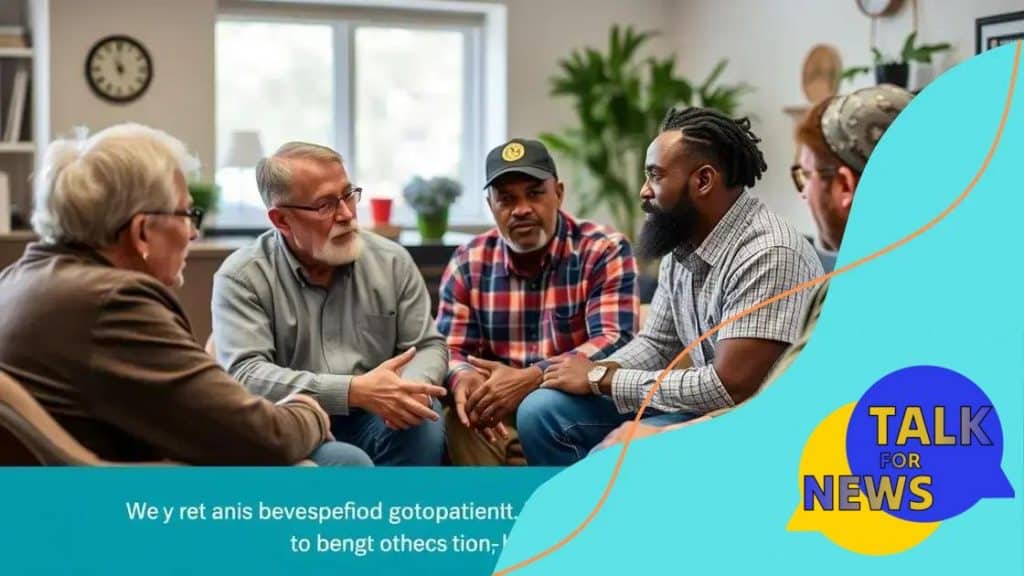The future of government-funded programs for veterans

Anúncios
The future of government-funded programs for veterans focuses on personalized services, technology integration, and improved mental health support to better meet the unique needs of veterans navigating their transition to civilian life.
The future of government-funded programs for veterans holds significant potential to enhance the lives of those who have served. With ongoing efforts to adapt and refine these initiatives, veterans may find a more supportive system tailored to their unique needs. Curious about what’s next? Let’s dive in.
Anúncios
Understanding the current landscape of veterans’ programs
Understanding the current landscape of veterans’ programs is crucial for those who served our country. There are many government-funded initiatives available, designed specifically to assist veterans in their transition to civilian life.
Types of Programs
Various types of programs exist to support veterans. These include educational benefits, healthcare services, and housing assistance. Each program has unique features made to cater to the diverse needs of veterans.
- **Education Benefits:** Programs like the GI Bill provide substantial aid for veterans seeking higher education.
- **Healthcare Services:** The VA offers healthcare tailored to veterans, addressing both physical and mental health.
- **Housing Assistance:** Various initiatives help veterans secure affordable housing and support them in the home-buying process.
Anúncios
These offerings help bridge the gap for many veterans. Understanding how to access these benefits is equally important. Many veterans face confusion about eligibility, deadlines, and the application process.
Accessing Benefits
Navigating the system can be challenging. The government provides several resources to help veterans and their families understand available programs.
- **VA Resource Centers:** These centers offer guidance and support for applying.
- **Online Tools:** Websites provide information and allow veterans to submit applications easily.
- **Community Organizations:** Many local groups assist veterans in their pursuit of benefits.
As the landscape of veterans’ programs evolves, it’s important to stay informed about changes that may enhance support. Recent discussions have focused on expanding benefits and improving accessibility, ensuring that all veterans can receive the support they deserve.
Key benefits of government-funded initiatives
Key benefits of government-funded initiatives provide essential support to veterans transitioning back to civilian life. These programs aim to address various needs and challenges that veterans may face.
Financial Support
One of the most significant advantages is the financial assistance available. Veterans often benefit from programs like the GI Bill, which covers tuition costs for education. This funding enables them to gain skills and qualifications that improve their job prospects.
- **Tuition Coverage:** Many educational programs are paid for, making higher learning accessible.
- **Housing Allowances:** Veterans can receive assistance with living expenses while studying.
- **Job Placement Services:** Programs often include resources to help find employment after graduation.
The support extends beyond education, assisting veterans in other areas of their lives as well. Healthcare services provided through government programs help veterans receive necessary medical care.
Healthcare Accessibility
With government-funded healthcare, veterans gain access to comprehensive services tailored to their needs. The VA offers a wide range of treatment options that include specialist care, mental health services, and rehabilitation.
- **Mental Health Services:** Resources for veterans dealing with PTSD and other mental health challenges.
- **Preventative Care:** Regular check-ups and screenings are part of the services offered.
- **Rehabilitation Services:** Assistance for veterans recovering from injuries sustained during service.
These healthcare benefits significantly reduce the burden of medical costs. Veterans can focus on their well-being rather than worrying about expenses. Moreover, access to such programs fosters better overall health in the veteran community, allowing individuals to thrive.
Community Engagement
Government-funded initiatives also promote community engagement. Programs encourage veterans to connect with one another and participate in local events. This engagement fosters a sense of belonging and support among veterans.
- **Networking Opportunities:** Events that help veterans build connections.
- **Volunteer Programs:** Many initiatives encourage veterans to give back to their communities.
- **Social Activities:** Opportunities to meet and socialize with fellow veterans.
By participating in community activities, veterans can find camaraderie and create lasting relationships. These bonds contribute to their overall sense of purpose and fulfillment.
Success stories from veterans utilizing these programs

Success stories from veterans utilizing these programs highlight the transformative impact of government-funded initiatives. Many veterans have turned their lives around thanks to the support available to them.
Educational Achievements
A notable success is seen in veterans who pursued higher education through programs like the GI Bill. This funding has allowed them to gain degrees and skills that improve their career opportunities.
- **John’s Journey:** After serving five years in the Army, John decided to enroll in college. With the GI Bill covering his tuition, he graduated with a degree in engineering.
- **Mary’s New Path:** A Navy veteran, Mary received training in healthcare. She now works as a nurse, helping others in her community.
- **David’s Success:** After completing his education funded by veteran programs, David secured a job with a technology firm, becoming financially stable.
These examples illustrate how the right support can lead to extraordinary outcomes. Many veterans have found new purpose and direction in their lives through these programs.
Healthcare Transformations
Mental health services provided by the VA have also had profound effects on veterans. Access to therapy and support groups has led to recovery and improved quality of life.
- **Mike’s Story:** Mike struggled with PTSD after returning home. Through government-funded programs, he found therapy and peer support that changed his outlook.
- **Sara’s Recovery:** Sara utilized mental health services, allowing her to address her challenges and reconnect with her family.
- **Tom’s Journey:** Tom shared his experiences in a veterans’ support group, helping others while also healing himself.
These personal stories highlight the essential role of veterans’ programs in fostering healing and growth. When veterans access the resources they need, they often achieve remarkable results.
Community Engagement
Participation in community initiatives has also led to inspiring changes. Many veterans dedicate their time to helping others, creating strong bonds within their communities.
- **Volunteer Efforts:** Veterans like Lisa and Derek lead local volunteer groups, making a positive impact on their neighborhoods.
- **Mentorship Programs:** Experienced veterans often mentor younger service members, sharing insights and guidance.
- **Advocacy:** Numerous veterans are becoming advocates for others, ensuring that benefits and resources are improved.
Through these efforts, veterans not only enhance their own lives but also inspire those around them, illustrating the power of support networks.
Challenges facing veterans in accessing benefits
Challenges facing veterans in accessing benefits can often create barriers to support. Despite the numerous programs available, many veterans struggle to navigate the system effectively.
Complex Application Processes
One significant challenge is the often complex application processes for veteran benefits. Many veterans find the forms confusing and may not understand what documents are required.
- **Lengthy Documentation:** Some applications require extensive documentation, which can be overwhelming.
- **Unclear Instructions:** The guidelines for completing applications are not always straightforward, leading to errors and delays.
- **Technical Barriers:** Veterans who are not comfortable with technology may find online applications particularly difficult.
This complexity can deter veterans from applying, preventing them from accessing the resources they need.
Lack of Awareness
Many veterans are not aware of the benefits available to them. This lack of awareness can stem from various factors, including limited outreach efforts and difficulty finding relevant information.
- **Insufficient Outreach:** Many programs do not reach all potential beneficiaries, leaving some veterans uninformed.
- **Transition Challenges:** Veterans may struggle to adjust to civilian life and miss out on key information during their transition.
- **Information Overload:** The vast amount of information available can lead to confusion, making it hard to identify needed resources.
Raising awareness about these programs is crucial to ensure that veterans can take advantage of the benefits designed to support them.
Emotional and Mental Health Barriers
Emotional and mental health challenges also play a role in limiting access to veteran benefits. Many veterans deal with issues such as PTSD, which can impact their ability to seek help.
- **Fear of Stigmatization:** Some veterans may hesitate to disclose their needs due to fear of judgment.
- **Overwhelming Emotions:** Anxiety and depression can make navigating the benefits system seem daunting.
- **Isolation:** Many veterans feel disconnected from others, making it harder to seek assistance or share their struggles.
Addressing these emotional and mental health barriers is vital for improving access to benefits and ensuring veterans receive the support they deserve.
Future trends and improvements in veterans’ support
Future trends and improvements in veterans’ support focus on making assistance more effective and accessible. As society evolves, the needs of veterans are increasingly recognized, leading to innovative solutions.
Personalized Services
One promising trend is the move towards personalized services for veterans. Programs are beginning to recognize that each veteran has unique needs. Tailoring support can lead to better outcomes.
- **Individual Assessments:** More programs will conduct assessments to determine specific needs.
- **Custom Plans:** Personalized plans can account for different backgrounds and experiences.
- **Ongoing Support:** Continuous check-ins ensure that veterans receive the right help over time.
This approach allows veterans to feel understood and valued, fostering a stronger connection to available resources.
Technology Integration
Another key development is the integration of technology into veterans’ support services. Digital platforms can simplify the benefits application process and improve access to information.
- **Mobile Apps:** Apps can provide easy access to resources and benefits information.
- **Telehealth Services:** Remote healthcare options are becoming more common, helping veterans access care from home.
- **Online Workshops:** Virtual workshops can provide valuable skills and networking opportunities.
By harnessing technology, veterans can connect to resources and services in ways that fit their lifestyles.
Enhanced Mental Health Programs
Expect to see more focus on mental health services moving forward. Recognizing the impact of mental health on overall well-being is crucial.
- **Holistic Approaches:** Programs will include various therapies, such as meditation and art therapy, alongside traditional care.
- **Peer Support Networks:** Connecting veterans with each other can reduce feelings of isolation.
- **Awareness Campaigns:** Initiatives to reduce stigma around seeking help can encourage more veterans to utilize available services.
These improvements aim to create a supportive environment where veterans can thrive. The emphasis on mental health will enhance the overall well-being of veterans as they transition back into civilian life.
In conclusion, the future of government-funded programs for veterans holds great promise. With a focus on personalized services, technological advancements, and enhanced mental health support, these programs are evolving to meet the unique needs of veterans. By addressing challenges and promoting awareness, we can create a supportive environment where veterans can thrive and achieve their goals. With continued improvements, our veterans will receive the recognition and assistance they deserve.
FAQ – Frequently Asked Questions about Government-Funded Programs for Veterans
What types of support do government-funded programs offer to veterans?
These programs offer educational benefits, healthcare services, housing assistance, and mental health support tailored to veterans’ unique needs.
How can veterans apply for benefits?
Veterans can apply for benefits through the VA website, local VA offices, or by contacting veteran support organizations for assistance with their applications.
What challenges do veterans face in accessing benefits?
Challenges include complex application processes, lack of awareness about available programs, and emotional barriers such as PTSD.
What future improvements are expected in veterans’ support services?
Future improvements include personalized services, greater technology integration, and enhanced mental health programs to better meet veterans’ needs.





